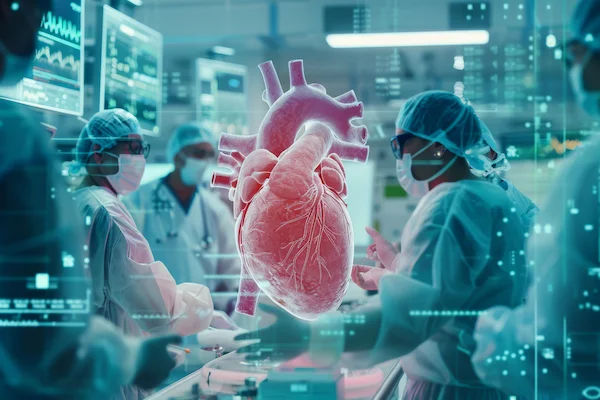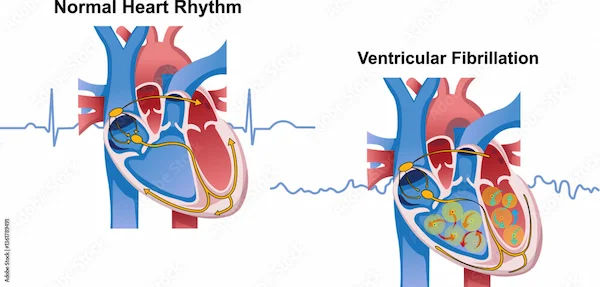Heart Diseases Warning Signs
Learn to recognise the warning signs of heart disease, including key symptoms to watch for, to ensure early detection and timely medical care.


Introduction
Your heart is a relentless engine, working 24/7 to pump life throughout your body. But sometimes, it sends out distress signals, subtle whispers or loud alarms that are crucial to recognise. Heart disease remains a leading cause of mortality worldwide, but early detection dramatically improves outcomes. This guide demystifies the warning signs of heart disease, empowering you to distinguish between benign aches and potential cardiac red flags. Many symptoms are misunderstood or attributed to less serious conditions like acid reflux or simple aging. We will walk you through the classic symptoms of a heart attack, the often-missed signs in women, and the indicators of chronic conditions like heart failure and arrhythmias. Knowledge is your first line of defense. By understanding these signals, you can take timely action, potentially saving your own life or that of a loved one. Let's learn the language of the heart.
The Classic Heart Attack Warning Signs
A heart attack (myocardial infarction) occurs when blood flow to a part of the heart is blocked. Time is muscle; the faster you act, the better the chance of survival and recovery.
Chest Pain or Discomfort (Angina): This is the most common symptom. It's often described not as a sharp pain, but as an uncomfortable pressure, squeezing, fullness, or pain in the center of the chest. It may last for more than a few minutes or go away and come back. The key sensation is one of "an elephant sitting on my chest."
Pain Radiating to Other Areas: The pain can spread beyond the chest to other areas of the upper body. This includes one or both arms (often the left), the back, neck, jaw, or even the stomach. This radiating pain is a hallmark sign that the issue is cardiac in nature.
Shortness of Breath and Cold Sweats: This can occur with or without chest pain. You may feel suddenly winded, as if you've just run a marathon without moving. This is often accompanied by breaking out into a cold sweat, feeling nauseated, or becoming lightheaded. If you experience this combination of symptoms of heart blockage, treat it as an emergency.
Consult a Cardiologist for the best advice
Symptoms That Are Different in Women
Heart disease symptoms in women can be dramatically different and are frequently overlooked. Women are more likely to experience symptoms unrelated to chest pain.
Atypical Chest Pain: Pressure vs. Sharpness: While some women do feel the classic chest pressure, others may experience sharp, fleeting pain in the chest that is easy to dismiss. The pain might not be severe and may not be the most prominent symptom.
Overlooked Signs: Fatigue, Nausea, and Jaw Pain: Women are more likely to report a cluster of other symptoms, often in the weeks leading up to a heart attack. These include:
- Unusual, overwhelming fatigue that isn't relieved by rest.
- Nausea, vomiting, or indigestion-like discomfort.
- Pain in the back, shoulders, or jaw. Jaw pain, in particular, is a significant red flag that is often mistaken for a dental issue.
- Shortness of breath without exertion.
Recognising these silent heart attack symptoms is critical for women's heart health.
Signs of Heart Failure: When the Heart Weakens
Heart failure doesn't mean the heart has stopped; it means it's not pumping blood as well as it should. This causes fluid to build up in the body, leading to specific symptoms.
Persistent Shortness of Breath (Dyspnoea): This is a key sign. You may experience breathlessness during physical activity, while resting, or even when lying flat. Some people wake up at night gasping for air and need to prop themselves up with pillows to breathe comfortably.
Swelling in Legs, Ankles, and Feet (Oedema): Due to poor blood circulation, the kidneys cause the body to retain fluid. This excess fluid often pools in the lower extremities due to gravity, causing noticeable swelling. Pressing on the skin may leave an indentation.
Rapid Weight Gain from Fluid Retention: This is a critical sign to monitor. A weight gain of 2-3 pounds in a day or 5 pounds in a week could be due to fluid buildup related to heart failure. If you notice this, it's essential to consult a doctor. Apollo24|7 offers a convenient home collection for tests like BNP (B-type Natriuretic Peptide), a blood test that can help diagnose or monitor heart failure.
What to Do in a Cardiac Emergency
If you or someone near you exhibits these warning signs, do not wait. Every minute counts.
1. Call for Emergency Help Immediately: Dial your local emergency number (e.g., 108 in India, 911 in the US). Do not attempt to drive yourself to the hospital.
2. Chew Aspirin: If not allergic, chewing an aspirin can help thin the blood and reduce heart damage.
3. Stay Calm and Rest: Sit or lie down in a comfortable position while waiting for help to arrive.
4. Use an AED if Available: If the person loses consciousness and an Automated External Defibrillator is available, use it as directed.
Prevention: How to Keep Your Heart Healthy
Prevention is the best medicine. Managing risk factors can significantly reduce your chances of developing heart disease.
- Know Your Numbers: Get regular check-ups to monitor blood pressure, cholesterol, and blood sugar levels. Apollo24|7 offers a convenient home collection for tests like the lipid profile and HbA1c, making it easy to stay on top of your health.
- Adopt a Heart-Healthy Diet: Focus on fruits, vegetables, whole grains, lean proteins, and healthy fats. Limit sodium, saturated fats, and added sugars.
- Stay Active: Aim for at least 150 minutes of moderate-intensity exercise per week.
- Manage Stress: Chronic stress can contribute to high blood pressure and other heart disease risk factors.
- Avoid Tobacco: Smoking is a major risk factor for heart disease.
If your cholesterol or blood pressure levels are not managed through lifestyle changes alone, consult a doctor online with Apollo24|7 to discuss potential medication and a long-term management plan.
Get Your Health Assessed
Conclusion: Your Health is in Your Hands
Your heart's warning signs are its way of crying out for help. Ignoring them can have devastating consequences. This guide has equipped you with the knowledge to recognise the critical differences between a simple ache and a cardiac emergency. Remember, symptoms like unexplained shortness of breath, unusual pressure in your chest, or swelling in your ankles are not to be taken lightly. While this information is powerful, it is not a substitute for professional medical advice. If you have any risk factors or are experiencing any of the symptoms mentioned, take action. Your proactive step today could save your life tomorrow. Schedule a check-up, talk to a cardiologist, and make the lifestyle changes necessary to ensure your heart keeps beating strong for years to come.
Consult a Cardiologist for the best advice
Consult a Cardiologist for the best advice

Dr. Chandra Prakash Thakur
Cardiologist
5 Years • MBBS, MD ( Medicine), DM ( Cardiology)
Guwahati
Apollo Hospitals G S Road, Guwahati

Dr. Vignesh Thanikgaivasan
Cardiologist
11 Years • MBBS, MD (Gen Med), DM (Cardiology) AFAPSIC, FIMSA, FSCAI
Chennai
Apollo Hospitals Greams Road, Chennai
(100+ Patients)

Dr. Prashant Adeppa
Cardiologist
10 Years • MBBS, MD General Medicine, DM Cardiology (Armed Forces Medical College)
Bengaluru
Apollo Hospitals Bannerghatta Road, Bengaluru

Mukhesh Rao
Cardiologist
25 Years • MBBS ( RANGARAYA MEDICAL COLLEGE ) MD ( ANDHDA MEDICAL COLLEGE ) DM ( KASTURBA MEDICAL COLLEGE MAHE MANIPAL).
Hyderguda
Apollo Hospitals Hyderguda, Hyderguda

Dr. Dibya Kumar Baruah
Cardiologist
24 Years • MD, DM
Chinagadila
Apollo Hospitals Health City Unit, Chinagadila
(300+ Patients)
Consult a Cardiologist for the best advice

Dr. Chandra Prakash Thakur
Cardiologist
5 Years • MBBS, MD ( Medicine), DM ( Cardiology)
Guwahati
Apollo Hospitals G S Road, Guwahati

Dr. Vignesh Thanikgaivasan
Cardiologist
11 Years • MBBS, MD (Gen Med), DM (Cardiology) AFAPSIC, FIMSA, FSCAI
Chennai
Apollo Hospitals Greams Road, Chennai
(100+ Patients)

Dr. Prashant Adeppa
Cardiologist
10 Years • MBBS, MD General Medicine, DM Cardiology (Armed Forces Medical College)
Bengaluru
Apollo Hospitals Bannerghatta Road, Bengaluru

Mukhesh Rao
Cardiologist
25 Years • MBBS ( RANGARAYA MEDICAL COLLEGE ) MD ( ANDHDA MEDICAL COLLEGE ) DM ( KASTURBA MEDICAL COLLEGE MAHE MANIPAL).
Hyderguda
Apollo Hospitals Hyderguda, Hyderguda

Dr. Dibya Kumar Baruah
Cardiologist
24 Years • MD, DM
Chinagadila
Apollo Hospitals Health City Unit, Chinagadila
(300+ Patients)
More articles from Heart disease
Frequently Asked Questions
Can you have heart problems without any symptoms?
Yes, this is known as silent heart disease. Conditions like hypertension or even a 'silent heart attack' can occur with minimal or no noticeable symptoms. Regular health screenings are essential for early detection.
What does heart-related shortness of breath feel like?
It's often described as an inability to get enough air, feeling winded without exertion, or waking up at night gasping. It's distinct from being out of shape, as it may occur during simple activities like walking across a room or making the bed.
How can I check for heart problems at home?
While you cannot diagnose yourself, you can monitor key indicators. Track your resting pulse, check for swelling in your ankles, and be mindful of unexplained weight gain. The most reliable method is to get regular professional check-ups that include blood pressure and cholesterol tests.
Is chest pain that comes and goes something to worry about?
Yes. Even intermittent pain can be a sign of unstable angina, a serious condition that precedes a heart attack. Any recurrent chest discomfort should be evaluated by a doctor to rule out cardiac causes.
What is the first thing to do if I think I'm having a heart attack?
Call your local emergency number immediately. Do not drive yourself. Chew one regular aspirin (if not allergic) and try to stay calm while waiting for paramedics to arrive.






